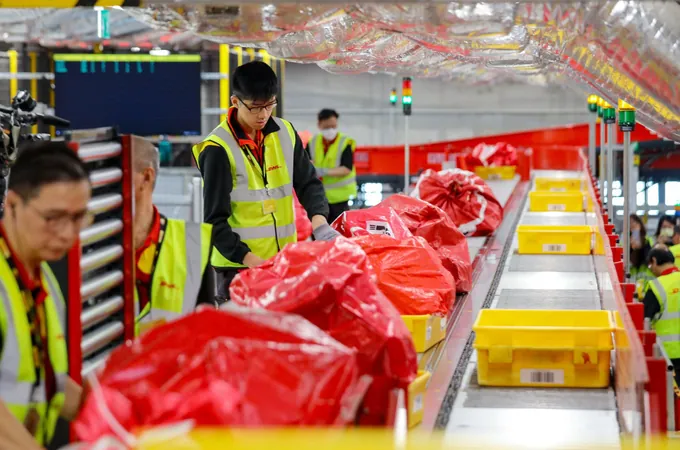
The Textile Industry's Long Shadow: Can Trump's Tariffs Revive South Carolina's Past?
2025-04-12
Author: Wei
From Glory Days to Ghost Towns
Once hailed as the textile capital of the world, South Carolina's Upstate region—especially towns like Union, Spartanburg, and Greenville—was bustling with lively mills churning out fabric. In the 1970s, workers like Adolphus Jones clocked in for long, hot summer shifts, surrounded by the roaring of trains transporting goods nationwide. But as automation and global labor markets took hold by the late 1990s, the textile industry evaporated, leaving economic devastation in its wake.
A Retired Worker Reflects: Is There Any Hope?
Fast forward to today, and Jones, now 71 and retired, scoffs at President Trump's ambitions for an American manufacturing renaissance fueled by tariffs. "The textile industry is dead," he asserts while adjusting his Italian-made suit. "Why would the younger generation want to work there?"
Trump's Tariff Tango: A High-Stakes Gamble
Since taking office, Trump’s administration has flip-flopped on tariffs, trying to pressure firms to haul manufacturing back to American soil. Recently, he reduced tariffs for key trading partners to a flat 10 percent but raised tariffs on Chinese goods significantly. Yet questions loom: could such moves really resurrect the textile sector?
Harsh Reality: The Legacy of Mill Work
Many locals recall the grueling conditions of mill work. Rosemary Rice, 70, notes the stigma attached to it—workers often crawled home covered in cotton flakes and many battled health issues like brown lung disease. "I wouldn't want my son working there," she emphasizes.
Global Giants Invest Where Mills Once Flew High
Today, the Upstate's economy thrives on automotive giants like BMW and Michelin. Since 1994, BMW has invested over $14.8 billion in Spartanburg, creating 11,000 jobs and making it America’s largest exporter of cars by value. But the region was stunned when a top White House trade adviser trashed BMW’s operations, asserting that the existing business model is detrimental to American interests.
Political Backlash and Economic Reality
South Carolina Governor Henry McMaster defended BMW, crediting its arrival with igniting a manufacturing boom in the state. Yet the state's historical anti-union stance and attraction of quality manufacturing jobs could be jeopardized by escalating tariff conflicts.
Dwindling Hopes: The Future of Textile Manufacturing
Many local experts, including Upstate SC Alliance President John Lummus, are skeptical about reviving the textile industry, arguing that conditions have drastically changed—personal income has surged from $3,250 in 1970 to about $56,000 today, adjusted for inflation.
A Complex Transformation: New Era or Just Nostalgia?
While remnants of the past remain—like the remodeled Judson Mill, now a mixed-use space—the job scene has shifted dramatically. Union's unemployment soared to 22 percent when mills shut, with many residents seeking work elsewhere. The new focus on renewable energy and high-tech manufacturing signals a broader change, leaving traditional textile jobs behind.
A Hope for Modern Mills?
Despite the doubts, some community members are open to a more advanced textile industry, lured by better working conditions and automation. Don Harkins of the Greenville Textile Heritage Society notes how modern facilities could attract youth shunning traditional college routes.
The Bottom Line: A Revival Seems Unlikely
While some dream of a textile comeback under Trump’s watch, local leaders like David Britt remain firm: "It will never come back." The region continues exploring new avenues for growth, but the glory days of textile manufacturing appear to be relegated to history.


 Brasil (PT)
Brasil (PT)
 Canada (EN)
Canada (EN)
 Chile (ES)
Chile (ES)
 Česko (CS)
Česko (CS)
 대한민국 (KO)
대한민국 (KO)
 España (ES)
España (ES)
 France (FR)
France (FR)
 Hong Kong (EN)
Hong Kong (EN)
 Italia (IT)
Italia (IT)
 日本 (JA)
日本 (JA)
 Magyarország (HU)
Magyarország (HU)
 Norge (NO)
Norge (NO)
 Polska (PL)
Polska (PL)
 Schweiz (DE)
Schweiz (DE)
 Singapore (EN)
Singapore (EN)
 Sverige (SV)
Sverige (SV)
 Suomi (FI)
Suomi (FI)
 Türkiye (TR)
Türkiye (TR)
 الإمارات العربية المتحدة (AR)
الإمارات العربية المتحدة (AR)